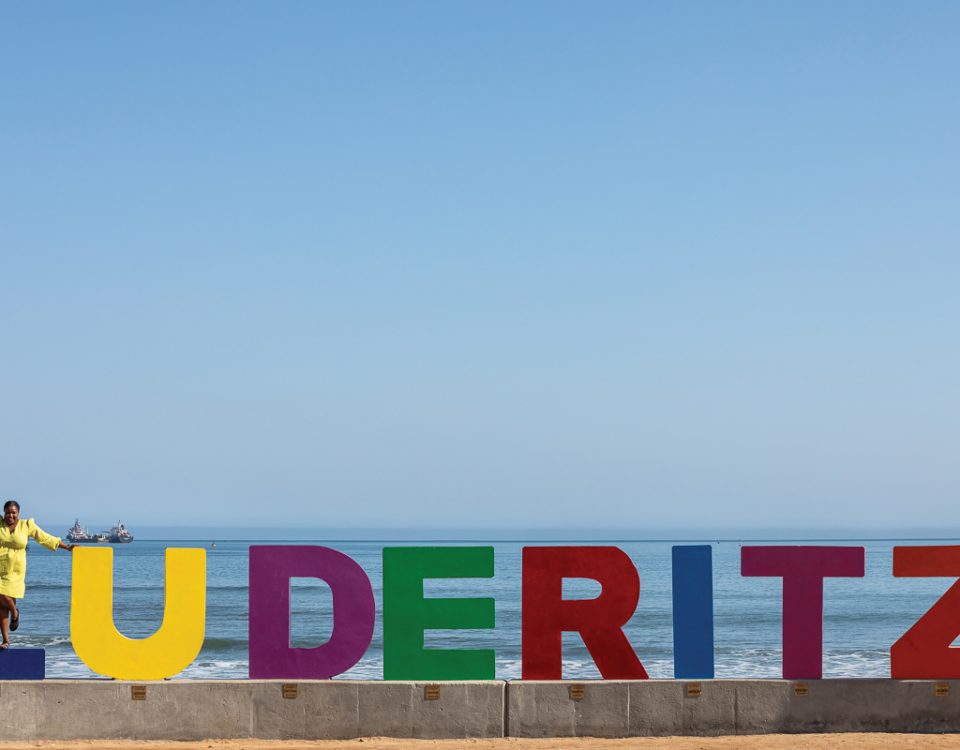Lüderitz Speed Challenge 2014 | Day 5
October 17, 2014Namibia | Tree Awards 2014
October 17, 2014By Jana-Mari Smithb
Breaking into the tourism business is tough – and, it can be argued, even more so for women. A landmark conference was hosted in Namibia this week during which women from 15 Southern African countries banded together to discuss, plan and reform their role in the tourism sector. Their goal: To develop an action plan that slices through barriers they feel is limiting or hampering their progress and existence within the current tourism sector framework.

Entertainment was at hand at the start and during breaks. Cultural Namibian performances underlined the unique offerings Africa can provide to visitors. Photo ©Jana-Mari Smith
But it’s not all about overcoming obstacles: several delegates were there to assure their colleagues that the cut-throat world of tourism can be conquered and that success is possible. Sharing their experiences and achievements, inspiring confidence, providing motivation and spurring on a go-getter attitude of ‘can do’, formed part of the two day event.
The inaugural “Southern Africa Women in Tourism Conference” will conclude today, following the two day meet hosted by Regional Tourism Organisation of Southern Africa (RETOSA). The conference will end with the election of a Steering Committee that will carry out annual objectives established here by the Women in Tourism group.
Delegates ranged from women involved in their own tourism enterprises, from start-ups to businesses that have offered tourism products for decades. Tourism students and governmental employees from the tourist sector, plus private tour organisation members were present.
The conference aims to offer, and foster, a fertile platform from which the women could debate and focus on current issues affecting their roles in the tourism sector. Most importantly, the conference aimed to unite the women by forging a unique and consolidated voice.
Participants could not only network and brainstorm, but also share their expertise and concerns. Moreover, guest speakers offered their insight and expertise on a number of subjects, ranging from “Policy issues – Barriers for Mainstreaming Women in Tourism projects and enterprises”, the challenges faced by women when it comes to funding tourism businesses and creating and understanding business plans, to the value of social media as a marketing tool.
One of the few men welcomed to the conference was the Deputy Minister of Environment and Tourism Pohamba Shifeta agreed that the conference constituted an ideal opportunity for women to “agree on a strategy” on how to mainstream them into the tourism sector.
The Deputy Minister reminded the delegates that tourism remains a top income generator, not only regionally, but around the world, and offers critical opportunities for countries to address unemployment, economic growth, poverty reduction, education and much more. This should be kept in mind while forging an industry that is inclusive and underlines equal rights and opportunities.

Buy a basket. A crafter in the Zambezi region. Tourists are avid buyers of traditional crafts. Photo ©Marita van Rooyen
The Deputy Minister also referred to studies which have mapped the role, barriers, and influences that women play in the tourism industry globally and regionally. He noted that the two day conference should inspire and motivate women – and deliver a “strong and formidable story of women in tourism in Southern Africa”.
In 2010, the UNWTO and UN Women released a joint study – Global Report on Women in Tourism.
The key overall findings of the report are:
1. Women make up a large proportion of the formal tourism workforce
2. Women are well represented in service and clerical level jobs but poorly represented at professional levels
3. Women in tourism are typically earning 10% to 15% less than their male counterparts
4. The tourism sector has almost twice as many women employers as other sectors
5. One in five tourism ministers worldwide are women
6. Women make up a much higher proportion of own-account workers in tourism than in other sectors
7. A large amount of unpaid work is being carried out by women in family tourism businesses
In terms of Employment, the report finds that women are well represented but tend to be working at a service or clerical rather than professional or decision-making level.
In Entrepreneurship, it found that women are almost twice as likely to be employers in the tourism industry than in other sectors, and often employ more women than men.
The results for Education are less promising – there are proportionally fewer women graduates in services than in other fields.
Tourism offers the potential for women’s Leadership. However, women still only represent one fifth of all tourism ministers and tourism board chairs. While tourism often contributes to Community development and provides opportunities for women’s self-employment, the report finds that women are contributing a large amount of unpaid work in tourism family businesses, especially when compared to other sectors.
Regional Tourism Organisation of Southern Africa (RETOSA) is a Southern African Development Community (SADC) body responsible for the development and growth of tourism in the region.
– See more at: http://www.wtmlondon.com/page.cfm/Action=Library/libID=1/listID=7/libEntryID=68#sthash.U0OwosOZ.dpuf
Regional Tourism Organisation of Southern Africa (RETOSA) is a Southern African Development Community (SADC) body responsible for the development and growth of tourism in the region.
– See more at: http://www.wtmlondon.com/page.cfm/Action=Library/libID=1/listID=7/libEntryID=68#sthash.U0OwosOZ.dpuf
Regional Tourism Organisation of Southern Africa (RETOSA) is a Southern African Development Community (SADC) body responsible for the development and growth of tourism in the region.
– See more at: http://www.wtmlondon.com/page.cfm/Action=Library/libID=1/listID=7/libEntryID=68#sthash.U0OwosOZ.dpuf
Regional Tourism Organisation of Southern Africa (RETOSA) is a Southern African Development Community (SADC) body responsible for the development and growth of tourism in the region.
– See more at: http://www.wtmlondon.com/page.cfm/Action=Library/libID=1/listID=7/libEntryID=68#sthash.U0OwosOZ.dpuf








